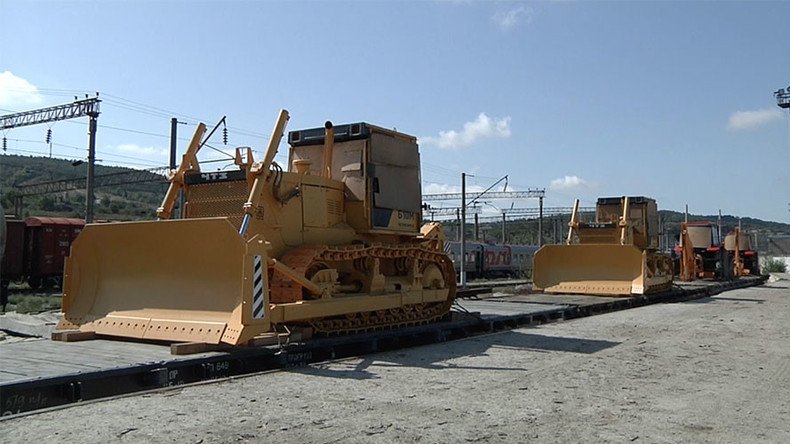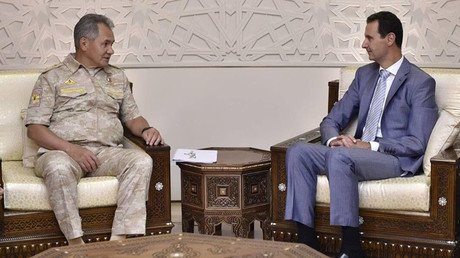Russia sends 4,000 tons of pipes, cables & machinery in reconstruction aid to Syria – MoD

Russia is preparing to send more than 4,000 tons of materials and over 40 pieces of construction equipment to Syria to help the war-torn country in its multibillion-dollar reconstruction effort.
The shipment of industrial aid that is currently being readied for dispatch will consist of “more than 40 units of construction equipment,” such as bulldozers, excavators and cranes, Russia's Defense Ministry said. In addition, the country will receive “over 2 thousand tons of metal pipes” that would be used to restore water infrastructure as well as “hundreds of kilometers of high-voltage and fiber-optic cables” to restore electricity and communications lines.
The construction material, which will be shipped from the port of Novorossiysk, will be used to restore “critical infrastructure” to those areas that have been recently freed from terrorist fighters, the Defense Ministry said, adding that hospitals and schools remain the priority.
The announcement of Russia's industrial aid support followed the meeting between Russian Defense Minister Sergey Shoigu and Syrian President Bashar Assad in Damascus Tuesday. With roughly 85 percent of Syrian territory cleared from terrorist fighters with the help of the Russian air force, Shoigu and Assad discussed military cooperation and joint actions against jihadists.
Just before flying off to Damascus, Shoigu sent a letter to the UN envoy for Syria, Staffan de Mistura, urging the UN to speed up humanitarian efforts as people across Syria are in dire need more than 1,000 tons of food and also over 80 tons of medicine.
Moscow and Damascus, along with the Syrian Arab Red Crescent (SARC) have recently been focusing on delivering aid to the former besieged residents of Deir ez-Zor, who are now recovering from three years of Islamic State (IS, formerly ISIS/ISIL) tyranny. In addition to food, medicine, and other supplies, Russia has also sent a team of sappers to demine the provincial capital which was liberated from the jihadist encirclement last week.
Russia sends sappers to help demine liberated parts of #DeirezZor – MoD https://t.co/hE2ETtBxgk#Syriapic.twitter.com/EZVSQbBBem
— RT (@RT_com) September 11, 2017
“Upon the directives of President Bashar al-Assad, tens of trucks, loaded with food, medical, educational, petroleum and basic materials were sent to be distributed to the families who have resisted the terrorist organizations,” the Governor of Deir Ez-zor Mohammad Ibrahim Samrah told Sana Tuesday.
With most of the territory in Syria under Damascus’ control, crushing the remaining pockets of terrorist resistance is just a matter of time. As Syrian forces continue to liberate the remaining 15 percent or roughly 27,000 square kilometers that is still controlled by the terrorists, reconstruction of the country will soon be the priority of President Assad.
After six years conflict, substantial resources is required to rebuild Syria. The World Bank estimates that apart from the human capital lost in the war, the country will need billions of dollars to support reconstruction efforts. Funding might prove a challenge though, considering the economic sanctions placed on the Syrian government by the West.
“Estimates by the World Bank show that if a political solution is reached today and reconstruction begins, it will take 10 years for the Syrian GDP to get close to its pre-war (2010) real GDP level, if the economy grows by 5 percent on average,” World Bank’s latest semi-annual MENA Economic Monitor report stated. “Growing at lower than this rate i.e. at 3 percent growth rate, will delay the recovery by another 10 years.”
READ MORE: Damascus to buy Iranian power generators for devastated Aleppo
“The scale of destruction and forgone economic growth – the loss in GDP relative to the “no-war” counterfactual in Syria alone is estimated at $200-300 billion – means that substantial resources will be needed for post-conflict reconstruction," the report added.














